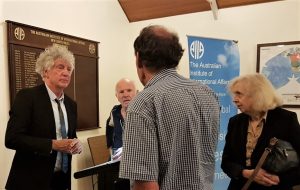The New Global Disorder and the Rise of Despotism
On Tuesday 14th May Professor John Keane of the University of Sydney spoke to the Institute about the rise of new political regimes threatening established, power-sharing democracies around the world, best described by an old term, despotism. Rising global powers such as Russia and China, and many smaller countries like Turkey, Hungary, Saudi Arabia and Turkmenistan, all share similarities that distinguish them from more customary labels such as totalitarian, authoritarian or dictatorial.
He noted that these despotic regimes are entangled, not only financially and politically, but also ideologically in seeking to undermine the established global order of the rule of law and democracy. All of these despotic regimes consider themselves democracies of some sort (Russian ‘managed democracy’ or Chinese ‘peoples’ democracy’) and ground their authority in the sovereignty of their citizens, whilst proclaiming their version of democracy as superior to the traditional western concept. These despotic regimes employ tools which give the illusion of democracy without ceding any real political power to the citizenry. They are ‘phantom democracies’; like phantom pregnancies, people experiencing them think they’re real.
Professor Keane identified nine features shared by the new despotic regimes: (1) despotic regimes understand that consent of the people is the source of their continued hold on power (2) each despotic regime is built upon patron-client relations that undermine the rule of law (3) all despotic regimes are plutocratic, employ state capitalism and produce vast inequality of wealth (4) despotic regimes control all forms of political discourse, often presenting conflicting positions, so as to both attract and isolate its population and prevent any serious independent movement against the state (5) despotic regimes have large, wealthy middle classes (6) all despotic regimes practice elections, though no real power is entrusted to the citizenry (7) despotic regimes utilise broad state media apparatuses to propagate their ideologies (8) despotic regimes camouflage state violence through fear and torture (9) all despotic regimes claim to exemplify societies founded on the rule of law, though in reality this is a façade, rife with corruption and injustice.
Professor Keane noted that it appears democracy is ‘dying by stealth’. Smaller and newer democracies are falling victim to despotism around the globe under the influence of rising global powers. Meanwhile, even long-established democracies like the United States, the United Kingdom and many European countries are losing credibility faced with these despotic regimes. Asked about how to withstand the coming onslaught and rebut arguments against our systems of government, he suggested that democracies clear their own Augean stables of growing inequality and corruption, for example through effective corruption watchdogs and institutionalised recognition of indigenous rights. He acknowledged that nationalisation of the media might combat the corrosive impact of wealthy media barons with their own agendas, but suggested this was a topic for another day.
In response to a question about mechanisms within the Chinese communist party permitting grassroots participation by party members in policy formation, he said these did not amount to much – they were not genuinely democratic but merely part of phantom democracy. Professor Keane left the audience to consider how democratic societies, like Australia, should combat this rise of despotism. He encouraged us to consider the existence of innate value in democratic systems in the face of criticism from despotic regimes that democracy has run its course. To do otherwise might spell the end of democracy as we know it.
Report by Nicholas Conomos
AIIA NSW intern
